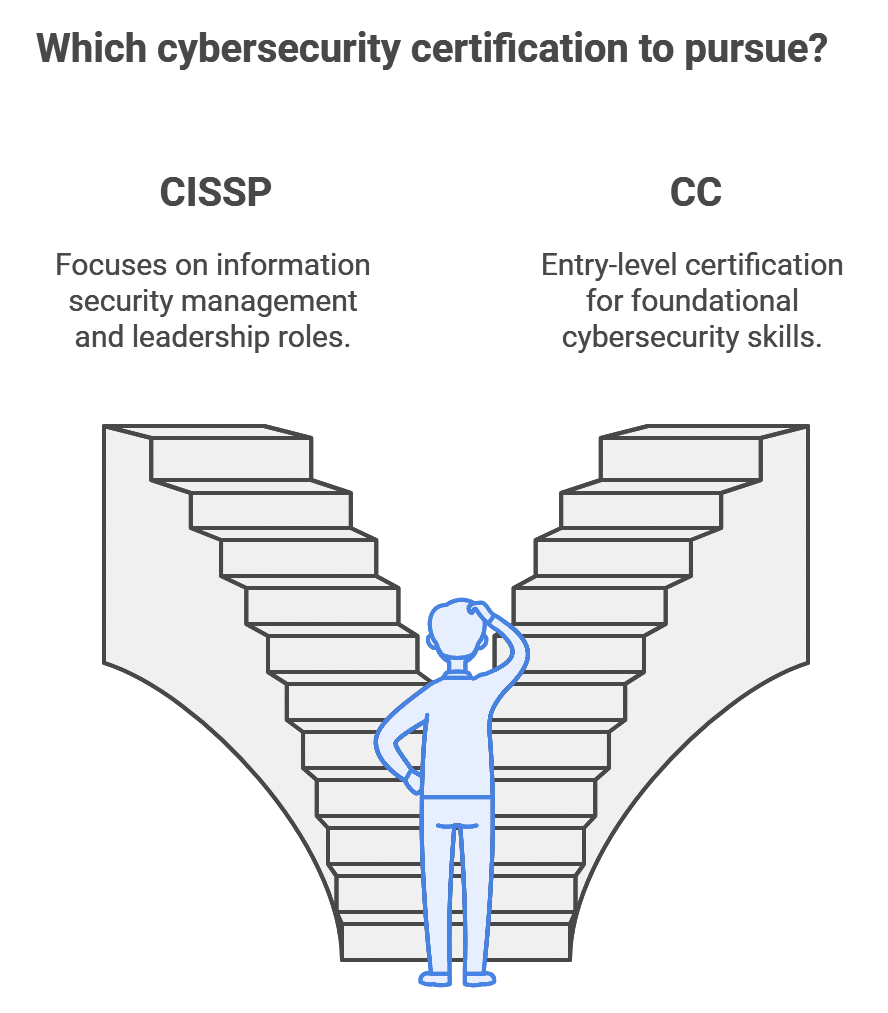Cybersecurity skills are in high demand in today’s increasingly digital world. With so many cybersecurity certifications available, picking the right one for you can be challenging.
If you are considering building a solid career in cybersecurity, two of the hottest certifications on the block are CISSP (Certified Information Systems Security Professional) and CC (Certified in Cybersecurity). CISA certification is another technical exam.
Each has its focus, requirements, and benefits; deciding between CISSP Vs CC isn’t always easy. So, let’s break it down and help you figure out which certification exam could be your golden ticket.

Let’s Understand Cybersecurity Certifications!
Cybersecurity certifications serve as professional stamps of approval, proving that you’ve got what it takes to protect digital information and ensure security. They help you develop critical cybersecurity skills and can make you stand out to employers. Certifications also show your professional goals and commitment to the field and can boost your confidence as you become a certified professional in cybersecurity.
But with so many certifications out there, how do you know which is right for you?
Enter CISSP and CC. Both are cybersecurity credentials offered by (ISC)², a globally respected organization in the cybersecurity world. CISSP is often viewed as the “go-to” certification for professionals who want to climb the ladder and manage security on a big scale. At the same time, CC is great for people stepping into cybersecurity.
What is CISSP Certification?
The CISSP certification is widely known as one of the most prestigious cybersecurity credentials. If you are an experienced security professional who wants to show off your skills and knowledge, the CISSP might be calling your name. It covers a broad range of topics across eight domains, from security and risk management to software development security.
CISSP is more than just technical know-how; it also focuses on managerial skills, making it perfect for professionals aiming for leadership roles.
What CISSP Covers:
- Security and Risk Management: Understanding security policies, risk management, and legal compliance.
- Asset Security: Knowing how to manage information and assets.
- Security Engineering: Learning about physical security and network design.
- Identity and Access Management (IAM): Understanding access control and authentication.
- Security Operations: Covering everything from investigation to recovery.
The CISSP is tough. You will need at least five years of work experience in two or more of the eight domains to qualify, though if you hold a related degree, you might reduce that by one year.
It’s a challenging but rewarding certification that can open doors to high-level positions like information security manager, security consultant, or IT auditor.
What is the CC Certification?
The CC certification (Certified in Cybersecurity) is the latest addition to (ISC)²’s certifications. Designed with beginners in mind, it’s a fantastic entry-level certification that doesn’t require prior work experience. Consider CC a stepping stone into cybersecurity, where you will learn the basics needed to build a strong foundation. This certification suits support team members, junior IT auditors, and cybersecurity analysts.
What CC Covers:
- Threat Detection and Mitigation: Learning the basics of identifying and dealing with threats.
- Network Security: An introduction to keeping networks secure.
- Information Assurance: Understanding the processes to protect information.
For those who are new to cybersecurity, CC offers a great start. It’s an accessible, foundational credential that helps beginners land roles in cybersecurity and provides the building blocks for further learning and professional growth.
CISSP vs CC: Which Certification Fits Your Career?
Choosing between CISSP and CC comes down to where you are in your career and where you want to go.
1. Technical vs. Managerial Focus
- CISSP has a balanced mix of technical and managerial skills, perfect for those who want to take charge of cybersecurity strategies or manage security teams. It’s great for people interested in the big picture of business security systems.
- CC leans toward a more technical, hands-on approach that builds a strong foundational knowledge of cybersecurity concepts. It’s ideal if you just start and want to develop solid skills in threat detection, access control, and basic security practices.
2. Career Advancement Opportunities
- If you’re aiming for a managerial role or high-level security position, CISSP could be your ticket. It’s recognized by employers worldwide as proof that you’re equipped to handle top-tier security responsibilities. Businesses often seek CISSP-certified professionals to manage teams and design security protocols for business systems.
- For beginners, CC is a solid certification for starting your cybersecurity journey. It shows employers that you’ve mastered essential cybersecurity principles and are ready to jump into junior roles. CC-certified professionals are great candidates for entry-level positions and can advance their careers by gaining experience or pursuing further certifications.
Exam Structures: What to Expect?
Both CISSP and CC come with their exam formats and requirements. Let’s break down the differences so you know what to expect.
CISSP Exam
- Experience Requirement: Requires five years of relevant work experience.
- Exam Structure: The CISSP exam is extensive and covers many topics. It comprises 125–175 questions, and you’ll have four hours to complete it.
- Preparation Needed: The CISSP exam is not for the faint-hearted! You’ll need a good preparation strategy and might benefit from online courses, practice tests, and solid study materials. There’s a lot to cover, so expect to dedicate a fair amount of time and effort.
CC Exam
- Experience Requirement: No prior experience is required, making it perfect for beginners.
- Exam Structure: The CC exam focuses on core cybersecurity knowledge with 100 questions and a two-hour time limit.
- Preparation Needed: While less intense than the CISSP exam, you must still study and understand fundamental cybersecurity concepts. Many find the CC exam achievable on their first attempt with the right resources.
Preparing for the Certification Examination
Preparation is key to passing these certification exams on the first attempt. Here’s how to tackle each:
- For CISSP: Since it covers an extensive range of topics, you will need detailed study materials, CISSP Exam Braindumps, and possibly a study group to prepare fully. It’s worth investing in training courses or prep books that cover all eight domains in detail. Going over practice questions and sample tests can be helpful to feel comfortable with the exam format.
- For CC: The CC exam focuses on foundational concepts, so brushing up on basics is essential. Many resources, like study guides and online courses, can help you understand the main ideas.
Cert Empire can help you a great deal in certification exam preparation. They provide thorough exam dumps that contain questions from past papers. The practice exams are also a great way to get familiar with the structure and types of questions you will see.
Maintaining Your Certification
After passing, your journey doesn’t stop there. Both certifications require ongoing learning to stay up-to-date.
To maintain CISSP, you will need to earn Continuing Professional Education (CPE) credits, which help you stay informed about the latest trends and skills in cybersecurity. The same applies to CC, though the requirements are generally less demanding.
The Impact of Cybersecurity Certification on Your Career
Certification exams validate your knowledge, give you a competitive edge, and often result in better job opportunities and higher pay. For those with certifications like CISSP or CC, employers know you have the skills needed to protect data, handle threats, and secure business systems.

Choosing the Right Certification: CISSP or CC?
When it comes down to it, choosing between CISSP vs CC is about your career goals, current experience, and what you hope to achieve:
- Choose CISSP if you want a high-level role in information security management or a consulting position responsible for large-scale security strategies. The CISSP certification is ideal if you see yourself leading teams, conducting risk assessments, or helping businesses develop security policies.
- Choose CC if you are new to cybersecurity and want to build a strong foundation. It’s the perfect choice if you are interested in technical roles, such as working as part of a support team or assisting with network security.
Wrapping It Up!
Ultimately, CISSP and CC certifications offer great value and can significantly boost your career. CISSP might be the better choice if you are aiming for leadership roles such as managers and have experience in the field, while CC is perfect for those at the start of their cybersecurity journey.
Whatever you choose, you are investing in yourself and your career.
FAQs: CISSP vs CC Certification
Who should take the CISSP certification?
CISSP is best for those with at least five years of experience in cybersecurity and who want to take on higher-level roles, like managing a security team or working as a security consultant.
Who is the CC certification for?
The CC certification is great for people new to cybersecurity. It’s designed for those who want to learn the basics and get started in entry-level roles, like cybersecurity analyst or IT auditor.
4. Do I need experience to take the CC certification?
No experience is required to take the CC certification. It’s perfect for beginners looking to build foundational cybersecurity skills.
Do I need experience to take the CISSP certification?
You will need at least five years of experience in two or more cybersecurity areas covered by the CISSP. You can reduce this requirement by one year if you have a related degree.
How hard is the CISSP exam?
The CISSP exam is challenging because it covers many topics in detail. It requires strong preparation, but it can be passed on the first attempt with the right study materials and practice.
Is the CC exam easier than the CISSP exam?
Yes, the CC exam is generally easier than the CISSP because it covers foundational topics. It suits beginners, whereas the CISSP is more advanced and complex.
What jobs can I get with a CISSP certification?
With CISSP, you can qualify for senior roles like information security manager, security consultant, or IT auditor. It’s respected worldwide and can open doors to management positions.
What jobs can I get with a CC certification?
With a CC certification, you can start in roles like cybersecurity analyst, support team member, or junior IT auditor. It’s ideal for entry-level cybersecurity positions.
How should I prepare for the CISSP exam?
To prepare for CISSP, use study guides, take practice exams, and consider online courses. CISSP covers many topics, so a detailed study plan is key to success.
How should I prepare for the CC exam?
For the CC exam, focus on learning the basics of cybersecurity. Study guides, practice tests, and online resources can help you build a strong foundation.
What is the cost of CISSP vs. CC certification?
The CISSP exam is typically more expensive, often costing around $749. The CC exam is more affordable, usually priced around $199.
How long is the CISSP exam?
The CISSP exam is 4 hours long, with 125–175 questions that test your knowledge across multiple cybersecurity domains.
How long is the CC exam?
The CC exam is 2 hours long and has about 100 questions covering basic cybersecurity principles.
Do I need to maintain my CISSP or CC certification after passing?
CISSP and CC require you to earn Continuing Professional Education (CPE) credits to keep your certification valid. This helps you stay current with cybersecurity trends.
Which certification is better for career growth: CISSP or CC?
Both certifications offer career benefits. CISSP is better for advanced positions and management roles, while CC is great for starting a career in cybersecurity.
Can I take CISSP and CC if I want both?
Yes, you can! Many professionals start with CC to build a foundation and then pursue CISSP as they gain experience and aim for higher-level roles.
Will CISSP or CC help me get a higher salary?
Yes, certifications like CISSP and CC can make you more competitive in the job market and may lead to higher salaries. CISSP, especially, is known for its impact on senior-level salary potential.
Can I take these exams online?
The CC exam can be taken online. The CISSP exam is typically offered at authorized testing centers but may sometimes be available online, depending on your location.
How soon can I retake the exam if I don’t pass?
If you don’t pass the CISSP or CC exam, you must wait a specified period before retaking it. For CISSP, this is usually 30 days after the first attempt. For CC, it’s often a shorter wait, around two weeks.
Where can I find study materials for these certifications?
Study materials are available on the (ISC)² website and through third-party providers. Look for study guides, online courses, and practice exams to help you prepare.
Do employers value these certifications?
Absolutely! Both CISSP and CC are respected certifications that demonstrate your commitment and cybersecurity knowledge, making you more attractive to employers.


























